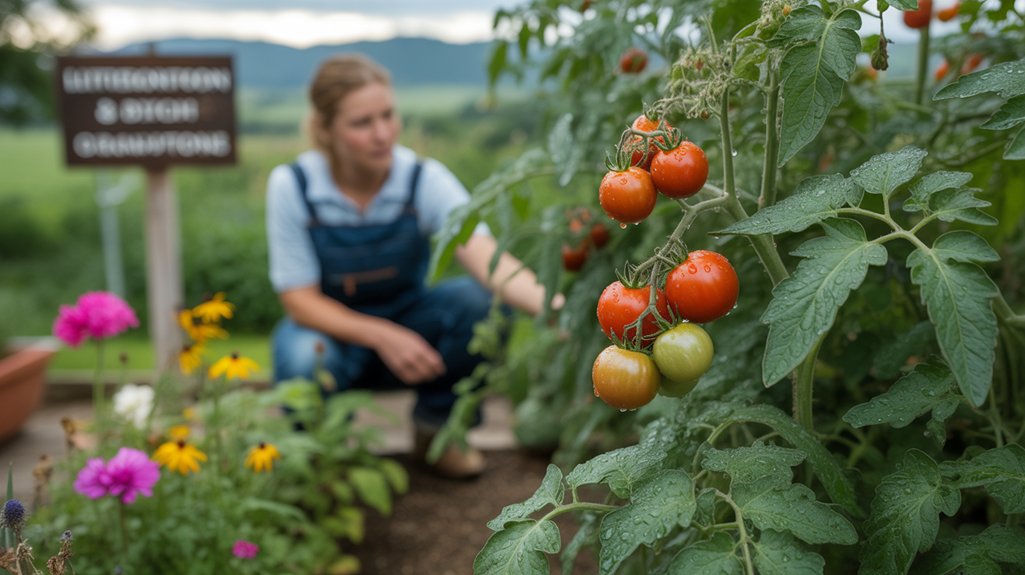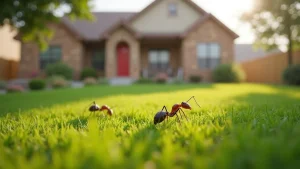Protecting Your Garden From Common Diseases in Littleton and Brighton
In Littleton and Brighton, safeguarding your garden from common diseases is crucial for healthy plants. You might notice that overcrowded areas can lead to issues like powdery mildew and rust. By improving air circulation and selecting disease-resistant varieties, you can make a significant difference in garden disease prevention in Littleton and Brighton. But there’s more to it than just these steps. Understanding the specific threats in your area will further enhance your garden’s defenses. What should you consider next?
Understanding Common Plant Diseases in the Region
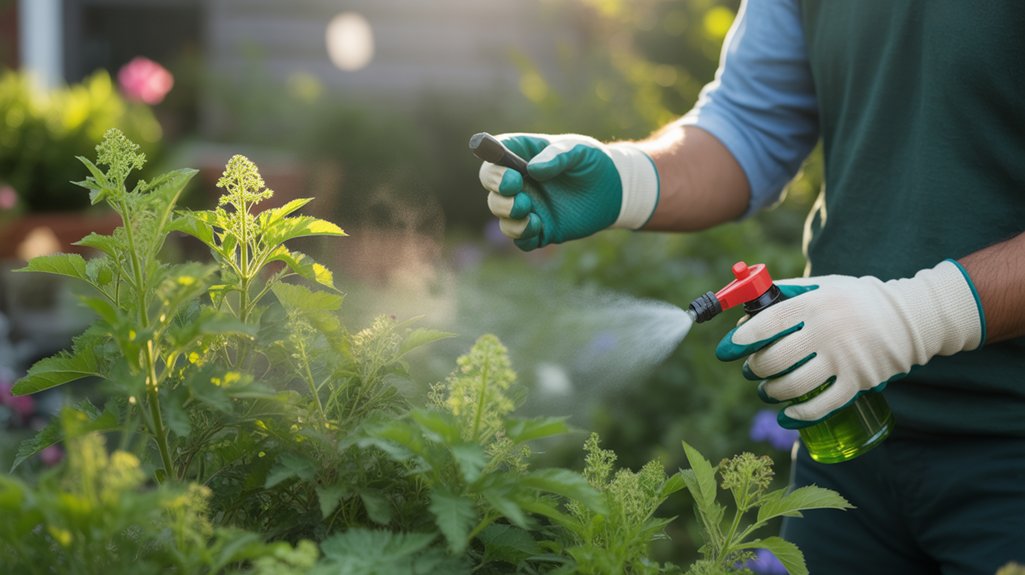
Understanding the common plant diseases in your region is crucial for maintaining a healthy garden. By familiarizing yourself with local pathogens, you can proactively implement garden disease prevention in Littleton and Brighton.
In Littleton and Brighton, you’ll likely encounter issues like powdery mildew, rust, and root rot. Each of these diseases thrives in specific environmental conditions, making it essential to adjust your gardening practices accordingly.
For instance, ensuring proper air circulation and avoiding overcrowding can significantly reduce the risk of fungal infections. Additionally, rotating your crops and using disease-resistant varieties can bolster your plants’ defenses.
Stay informed and keep an eye on your garden’s health; taking these steps will help you protect your plants from the common threats they face in your area.
Identifying Symptoms of Plant Ailments
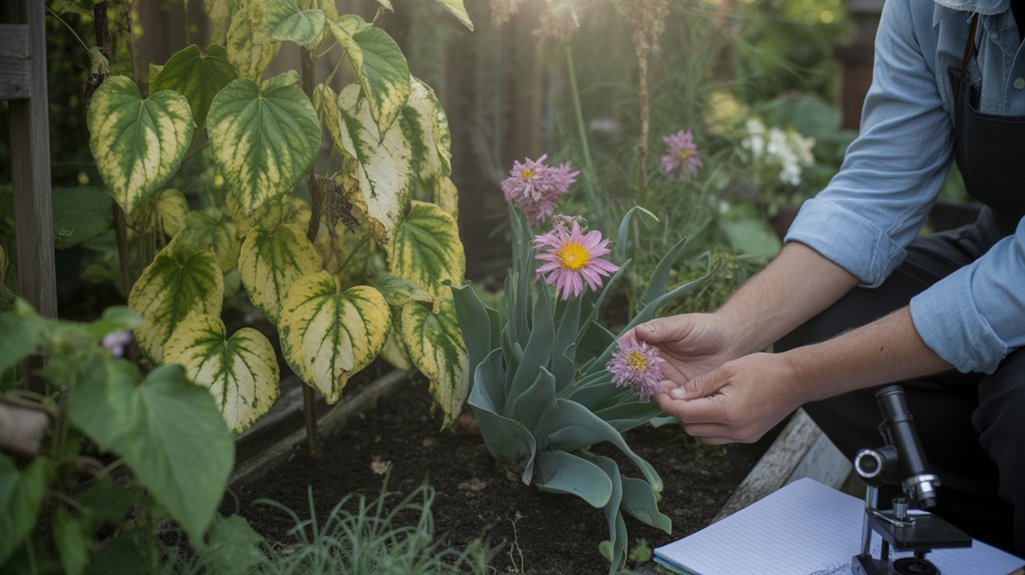
To effectively protect your garden, recognizing the symptoms of plant ailments is essential for garden disease prevention in Littleton and Brighton. One of the most common signs to watch for is leaf discoloration. If you notice yellowing or browning leaves, it could indicate nutrient deficiencies or diseases.
Additionally, pay attention to wilting plants, as this often points to issues with water uptake. Root rot is another serious condition; if plants appear stunted and the soil is overly moist, check the roots.
Healthy roots should be white and firm, while rotted roots look brown and mushy. By identifying these symptoms early, you can take action to address problems before they escalate, ensuring a healthier garden in Littleton and Brighton.
Best Practices for Soil Health
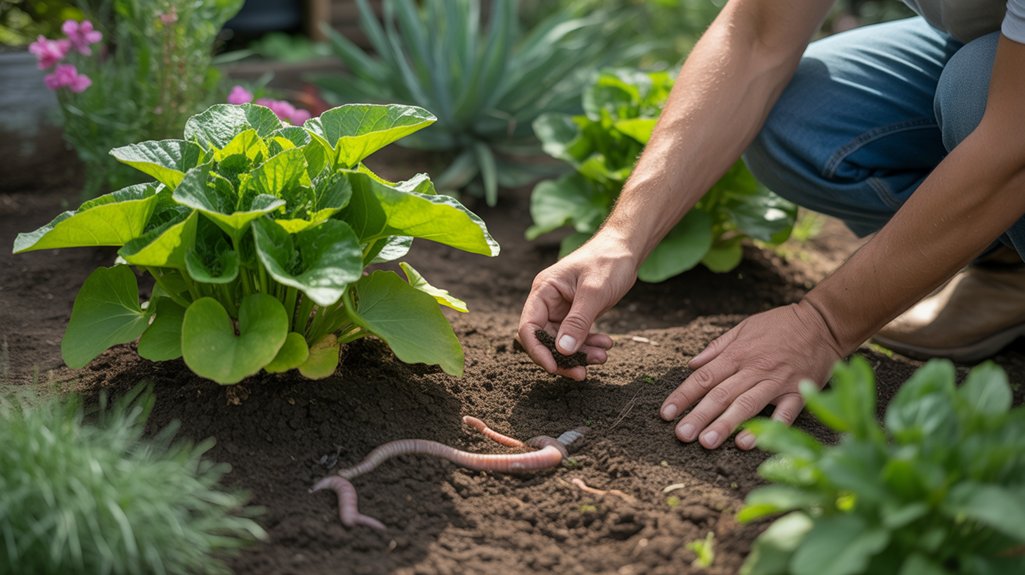
While you might focus on your plants, their health largely depends on the soil they grow in. To ensure your garden thrives, you should prioritize soil health through proper practices for garden disease prevention in Littleton and Brighton. Start by testing your soil to understand its nutrient balance. Incorporate soil amendments like compost or aged manure to enrich it. Regularly rotate your crops to prevent nutrient depletion and pest buildup. Mulching can help retain moisture and suppress weeds.
Here’s a quick reference table to guide you:
| Soil Amendment | Benefits | Application Frequency |
|---|---|---|
| Compost | Enhances nutrients | 1-2 times a year |
| Aged Manure | Improves soil structure | Annually |
| Cover Crops | Prevents erosion | Seasonal |
| Bone Meal | Boosts phosphorus | Before planting |
| Lime | Balances pH | Every 2-3 years |
Effective Watering Techniques
Effective watering techniques are crucial for maintaining a healthy garden and supporting garden disease prevention in Littleton and Brighton. Consider using drip irrigation. This method delivers water directly to the roots, minimizing evaporation and runoff. It’s efficient and helps you avoid overwatering risks, which can lead to root rot and other diseases.
Water your garden early in the morning or late in the evening when temperatures are cooler. This timing reduces evaporation and allows your plants to absorb more moisture.
Aim for deep, infrequent watering rather than shallow, frequent sessions. This encourages deeper root growth, helping your plants become more resilient.
Organic Pest Control Methods
As you cultivate your garden, embracing organic pest control methods can safeguard your plants from harmful insects without resorting to chemicals, aiding garden disease prevention in Littleton and Brighton.
Here are three effective techniques you can use:
- Natural Remedies: Use garlic spray or neem oil to deter pests. These solutions disrupt their feeding and breeding cycles.
- Beneficial Insects: Introduce ladybugs or lacewings, which prey on aphids and other common pests. They’re nature’s little helpers!
- Companion Planting: Plant marigolds or basil alongside your vegetables; they can repel unwanted pests while attracting the right pollinators.
For more organic pest control tips, visit this Old Farmer’s Almanac guide.
Importance of Crop Rotation
Implementing organic pest control methods helps protect your garden, but there’s another strategy that can significantly enhance plant health: crop rotation. By rotating your crops, you increase crop diversity, which helps break pest and disease cycles. Different plants have varying nutrient requirements, so this practice also maintains soil nutrients, leading to healthier growth and supporting garden disease prevention in Littleton and Brighton.
Here’s a quick reference table to guide you:
| Crop Type | Benefits |
|---|---|
| Legumes | Fix nitrogen in soil |
| Brassicas | Improve soil structure |
| Nightshades | Deter certain pests |
| Root Vegetables | Enhance soil aeration |
| Grains | Reduce weed competition |
Incorporating crop rotation not only boosts your garden’s resilience against diseases but also promotes a thriving ecosystem in your soil.
Seasonal Maintenance Tips for a Healthy Garden
Maintaining a healthy garden year-round requires attention to seasonal changes and specific tasks. By following these seasonal maintenance tips, you’ll keep your garden thriving and support garden disease prevention in Littleton and Brighton:
- Seasonal Pruning: Trim dead or overgrown branches in early spring and fall. This encourages healthy growth and improves air circulation.
- Mulching Strategies: Apply a layer of mulch around your plants after spring planting. This helps retain moisture, suppress weeds, and regulate soil temperature.
- Regular Inspections: Check your plants for signs of disease or pests regularly. Early detection is crucial for effective treatment and prevention.
Frequently Asked Questions
What Are the Best Plants Resistant to Common Diseases in This Area?
When choosing plants, consider disease-resistant varieties like coneflowers and black-eyed Susans. Native plants offer additional benefits, thriving in local conditions while supporting wildlife and requiring less maintenance, making your garden healthier and more sustainable.
How Can I Prevent Disease Spread Between My Plants?
To prevent disease spread between your plants, practice crop rotation and maintain soil health. This keeps pathogens at bay and ensures your plants thrive. Regularly inspect your garden and remove any infected foliage promptly for effective garden disease prevention in Littleton and Brighton.
Are There Local Resources for Disease Identification and Management?
You can access local resources for disease identification and management through your local extension office. Join community workshops to learn effective strategies and connect with fellow gardeners who can share valuable experiences and insights.
What Is the Role of Weather Conditions in Plant Diseases?
Weather patterns and temperature fluctuations significantly influence plant diseases. You’ll notice that extreme conditions can weaken plants, creating an ideal environment for pathogens. Monitoring these changes helps you take proactive steps to protect your garden effectively.
How Often Should I Inspect My Garden for Diseases?
You should inspect your garden regularly for disease symptoms, ideally every week. This inspection frequency helps you catch issues early, preventing spread and ensuring your plants stay healthy and vibrant throughout the growing season.
By following these tips, you can effectively achieve garden disease prevention in Littleton and Brighton. Keep an eye out for symptoms, maintain healthy soil, and practice good watering techniques. Don’t forget the importance of crop rotation and organic pest control to strengthen your plants. With seasonal maintenance and a proactive approach, you’ll create a thriving garden that’s resilient against diseases. For professional help, contact Above & Beyond Services to ensure garden disease prevention in Littleton and Brighton. Get started today, and enjoy the fruits of your labor!
Key Takeaways
- Ensure proper air circulation and avoid overcrowding to reduce the risk of fungal infections like powdery mildew and rust.
- Regularly test soil to understand nutrient balance and incorporate compost to enrich it, enhancing plant defenses for garden disease prevention in Littleton and Brighton.
- Practice crop rotation to prevent nutrient depletion and reduce pest populations, which helps protect your garden’s health.
- Utilize organic pest control methods, such as introducing beneficial insects and using natural remedies, to deter harmful pests without chemicals.
- Monitor plants for symptoms like leaf discoloration or wilting, allowing for early identification and timely action against diseases.

